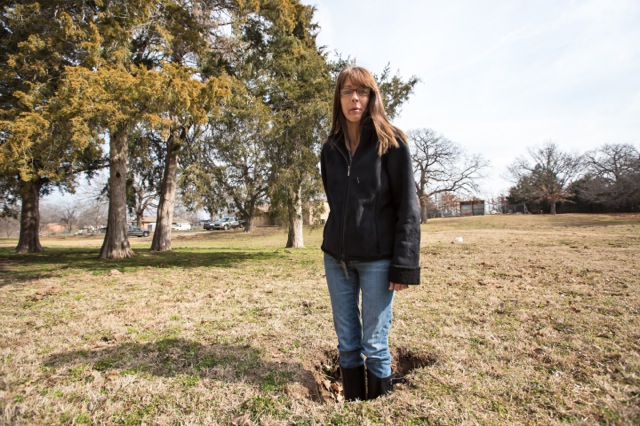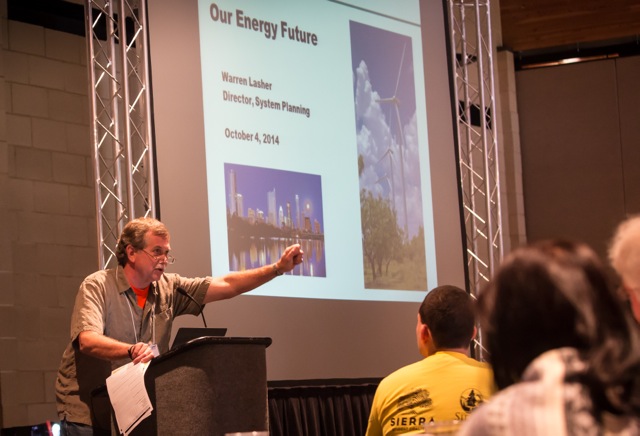
New rules for Texas injection wastewater well operators offer no relief to people impacted by more than 30 earthquakes that hit Azle, Reno and Springtown almost a year ago. Many buildings in the three small cities, 50 miles west of Dallas, Texas, suffered broken windows, cracked walls, damaged plumbing and foundations.
Seismic activity is not something the region is known for. It was only after deep injection disposal wells used to house fracking’s toxic wastewater went into operation that the earthquakes started. There are several injection wells in the area — three of which some suspect to be the cause of the quakes due to their proximity to impacted neighborhoods and the volume of disposal operations.
 Crack in an Azle, Texas, residence that opened after an earthquake. (Photo: Julie Dermansky)
Crack in an Azle, Texas, residence that opened after an earthquake. (Photo: Julie Dermansky)
“Injection raises the underground pressure and can effectively lubricate fault lines, weakening them and causing earthquakes, according to the US Geological Survey,” reports McClatchy Washington Bureau.
The Texas Railroad Commission, the agency that regulates the oil and gas industry, was met with public outcry after the first earthquake swarm. The commissioners acted fast (by the agency’s standards), coming up with new rules to address the situation released on Oct. 28.
The new rules require oil and gas companies to check local seismic data from the US Geological Survey before opening a new waste disposal well. They also give the agency the power to change, suspend or revoke an injection operator’s permit if the commission determines the well is contributing to seismic activity.
 Barbara Brown in a sinkhole on her lawn. (Photo: Julie Dermansky)
Barbara Brown in a sinkhole on her lawn. (Photo: Julie Dermansky)
“By taking action, the commission acknowledged there was a problem, but by not establishing a connection between the injection well activity and the earthquakes they retain deniability for causing the problem,” says Barbara Brown, who lives at the earthquakes swarms’ epicenter.
There have been fewer earthquakes measuring over three points on the Richter scale since January but “the shaking has not stopped,” she told DeSmogBlog.
Brown’s home has cracks inside and out that weren’t there before the quakes and small sinkholes continually open up on her land. She was forced to give her horse away for its own safety. The horse injured its leg after stepping in a hole, and Brown feared it would end up breaking its leg the next time.
“The new rules don’t do anything to help pay for damages,” Reno, Texas, mayor Lynda Stokes told DeSmogBlog. “They are the first step in a long road that needs to be followed.”
After the quakes started, Stokes took a crash course in geology and learned about the connection between injection wells and seismic activity. “The proof is there that a connection exists,” she says.
Stokes thinks the Railroad Commission needs to set a moratorium on injection well use in residential areas until it can prove the wells are not the cause of the earthquakes.
“The new rules were worked out over a period of months in consultation with representatives of the oil and gas industry, which widely supported the change,” Commissioner David Porter said in a statement. “These comprehensive rule amendments will allow us to further examine seismic activity in Texas and gain an understanding of how human activity may impact seismic activity, while continuing to allow for the important development of our energy resources in Texas.”
Outgoing State Rep. Lon Burnam, D-Fort Worth, says the new rules will not prevent a rash of earthquakes. Since the Railroad Commission “refused to recognize any causation link between seismic activities and disposal well operations,” Burnam told the Dallas Business Journal, “the Railroad Commission is unlikely to use its new authority since it is unlikely to ever find that the applicable evidentiary standard has been met.”
Why don’t the commissioners do more?
“The Texas Railroad commissioners are the mouthpiece for industry,” Stokes says.
The Post Carbon Institute’s latest report exposes inflated predictions by the Energy Information Administration of how much oil and gas is accessible by hydraulic fracturing that have led to local government officials relaxing restrictions on the fracking industry. The fracking industry is exempt from the Clean Air and Water Act, a loophole that complicates meaningful regulation.
The false sense of the shale’s oil and gas abundance has also contributed to businesses and consumers doing little to transition away from fossil fuel use.
 Texas State Rep. Lon Burnam speaking at the Earth, Wind & Fire Energy Summit. (Photo: Julie Dermansky)
Texas State Rep. Lon Burnam speaking at the Earth, Wind & Fire Energy Summit. (Photo: Julie Dermansky)
When Texas State Rep. Lon Burnam spoke to a packed house at the Earth, Wind & Fire Energy Summit, sponsored by the Sierra Club in Dallas on October 4, he commended the people who turned out. The conference featured experts on various forms of energy, including renewables, and the challenges to powering the future.
“Too many of the general public in Texas would rather shop till they drop or watch sports events until they are numb in their brain than pay attention to what is happening in their communities,” Burnam says. “We need to reverse our excessive dependence on energy because we haven’t closed the gap with measures that are sustainable.”
Stokes, who attended the conference, agrees there must be a push toward renewable energy. The water used by the fracking industry paired with the on-going drought affecting the area troubles her.
In the course of the year, Stokes has gone from denying she is an environmentalist to embracing the title.
“As far as the boom economically, the only booms we have got are the earthquakes,” Stokes says. “I can live without oil and gas. It wouldn’t be convenient, but if you take away our air and water, we cease to exist.”
Thank you for reading Truthout. Before you leave, we must appeal for your support.
Truthout is unlike most news publications; we’re nonprofit, independent, and free of corporate funding. Because of this, we can publish the boldly honest journalism you see from us – stories about and by grassroots activists, reports from the frontlines of social movements, and unapologetic critiques of the systemic forces that shape all of our lives.
Monied interests prevent other publications from confronting the worst injustices in our world. But Truthout remains a haven for transformative journalism in pursuit of justice.
We simply cannot do this without support from our readers. At this time, we’re appealing to add 22 monthly donors before the end of the day. If you can, please make a tax-deductible one-time or monthly gift today.